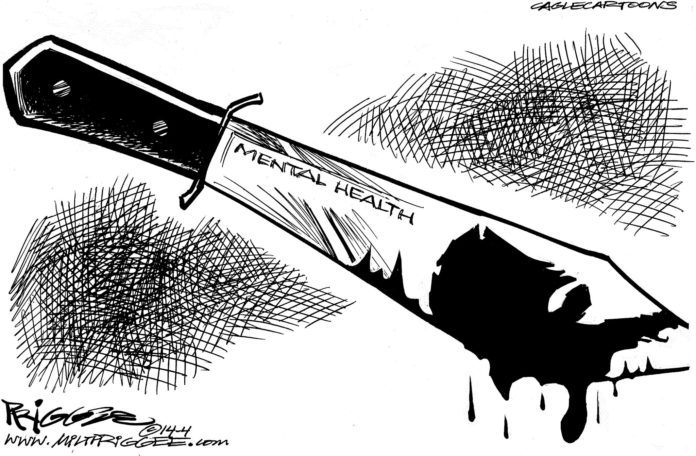BY DON HOLLADAY
Many like to point to the death penalty’s retention as a necessary ingredient of our state’s get-tough-on-crime philosophy. Instead, it represents just one more misperceived component of a criminal justice system that is sliding off a cliff.
If Oklahomans really want to be tough on crime, our elected leadership is going to have to confront the obvious: Oklahoma is now a national leader in virtually every important category that contributes to crime in our communities. If we want to reduce the costs of crime for the taxpayers, and make our communities safer, we are going to have to spend money to save money.
No one can seriously dispute the direct links between crime, inadequate funding of mental health services, and failure to address the drug and alcohol addiction of those we lock-up. Embarrassingly, Oklahoma is currently a leader in the number of incarcerated prisoners with a history of, or symptoms of mental illness.
In the Department of Corrections [DOC] 2013 annual report, 75% of our female inmates and 53% of male inmates had been diagnosed with mental illness. One-half of those behind bars with a treatable mental illness entered the system for a non-violent offense. Likewise, the 2012 DOC report showed nearly one-half of our Oklahoma prison population was behind bars for drug and alcohol offenses.
To incarcerate a prisoner costs the taxpayers $48 per day; to fund community health services for that same prisoner costs $25 per day. On an annualized basis, we pay $19,000 for each prisoner in the system. Conversely, a good drug court program runs $5,000 per offender. Importantly, the percentage of those who re-enter the criminal justice system after graduating from a drug court/treatment program is 6.5%, versus 23% for those who did not have access to such programs [based on a three-year study].
To make matters worse, common sense tells us that neglect of our state’s vital needs in other areas eventually impacts the criminal justice system as well.
I am now 71 years of age. Never, in the past 50 years, can I recall Oklahoma having elected leaders who are so oblivious to our state’s infrastructure, public services, educational needs, and the protection of our most vulnerable residents.
We have recklessly [or intentionally] let Oklahoma slide to the bottom of the heap nationally in virtually every area that counts. It should be no surprise that our failures ultimately and logically contribute to the spiral of crime.
Thus, in addition to ignoring critical mental health and drug/alcohol treatment issues, Oklahoma has deliberately turned down federal Medicaid expansion funds which would allow the most poor and their children access to affordable health care; we have become a national leader in allowing child poverty to go unchecked; each year we stay at or near the top in teen-age pregnancies; we stay at the highest level for the number of women incarcerated on a per capita basis; we stay in the bottom tier on a per capital basis for funding of public education; and we stay blind to the need to adequately prepare our children to enter the future’s workforce.
The impact of these choices on the prevention of crime seems obvious. If Oklahoma wants to create vibrant, safe communities, it has chosen the wrong path. Is it really any wonder that one recently reported study tagged Oklahoma as 45th in the nation for the “quality of life” of its citizens?
It doesn’t have to be like this, but as long as it continues, we have no one but ourselves to blame. While some hide behind our state’s recent oil slump and resultant budget problems as an explanation for why the funds are not there to meet Oklahoma’s most vital problems, this is just a ruse. Our legislative and executive branches were not interested in doing what needed to be done when oil was $110 per barrel. After all, the reports that condemn our failures didn’t just happen this year.
The reality is our criminal justice needs, our critical public needs, and ultimately our children’s future have been hijacked by elected decision-makers who think visionary leadership primarily means reducing taxes [who among us really thinks that the next refund of $31 for the average family will solve anything?]; or bashing the federal government [by claiming it is “broke” even though we take back more federal dollars each year than we pay in]; or criticizing state and federal judiciary constitutional decisions as “ignoring the will of the people.”
There are exceptions, of course – public servants who understand the proper and necessary functions of state government, are dedicated to the public good, who realize the meaning of being truly visionary, and who are willing to accept financial accountability. Unfortunately, these few voices are consistently muffled by “no spending” rhetoric, and an executive branch that always points a finger toward Washington, DC to explain any shortcoming.
Until the voters are ready to say “enough” to those who try to undermine the functioning of what responsible state government is all about, and until we stop listening to soundbite nonsense about everything except what is important, our slow train wreck will continue.
Our criminal justice system will grow worse, our quality of life will diminish further [despite the natural beauty of the place where we live and the friendliness of our residents], and the next generation – at least those who stay – will be left to pick-up the pieces.
– Oklahoma City attorney Don Holladay is best known most recently for representing two Tulsa County couples – Mary Bishop and Sharon Baldwin, and Gay Phillips and Susan Barton – in their successful fight for marriage equality. The U.S. Supreme Court affirmed their rights to marry last October when it declined to review an appeals court decision striking down Oklahoma’s same-sex marriage ban.







